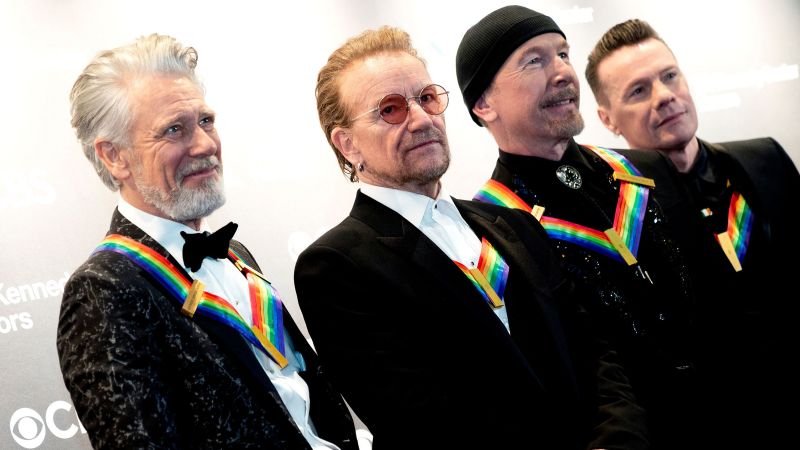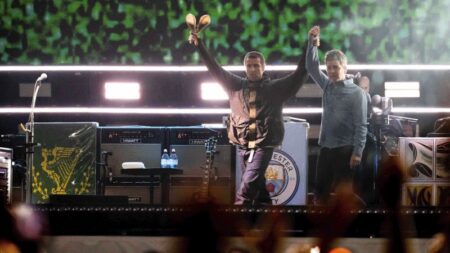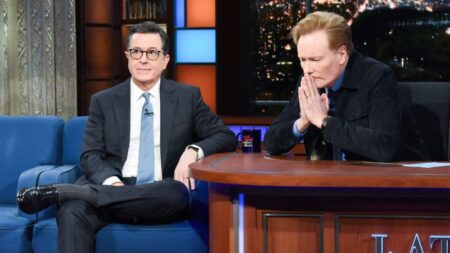The iconic rock band U2, known for their commitment to social and humanitarian issues, recently voiced their opinions regarding the escalating conflict in Gaza. Comprised of members Bono, the Edge, Adam Clayton, and Larry Mullen Jr., U2 has a history of coupling their musical prowess with activism. This time, they took to their official site to express their profound concerns over the recent violence, particularly the Hamas attacks on Israel that occurred on October 7, 2023. Their statements not only condemned these acts but also advocated for the safe return of Israeli hostages and emphasized the urgent need for humanitarian aid to reach civilians in Gaza and the West Bank.
The band’s official message highlighted an unsettling situation that they described as unprecedented, indicating the severe humanitarian crisis in Gaza. They articulated their horror about the ongoing conflict, remarking on the dangerous implications of blocking humanitarian aid and the overwhelming prospect of a military operation in Gaza City. Acknowledging their lack of political expertise in the intricate Middle Eastern landscape, they still felt compelled to clarify their stance on the matter, underlining the moral responsibilities they believe come with their platform.
In a personal reflection, Bono, the lead vocalist, expressed how the attack on the Nova music festival resonated deeply with him, as it felt as though it occurred while U2 was performing in Las Vegas. He candidly admitted his struggles with the complexities of the region’s politics, explaining that he had previously tried to distance himself from them. However, he acknowledged that his engagement with such topics was paramount, especially when witnessing the humanitarian catastrophes that echo his own experiences with suffering and loss in different parts of the world, particularly in Africa.
Bono detailed his emotional reaction to the suffering he has observed in Gaza, where images of starving children deeply affected him, stirring memories of his firsthand experiences with famine in Ethiopia. He emphasized that the realities of chronic malnutrition and the loss of non-combatant lives, particularly among children, convey a sense of calculated evil that must be resisted across all faiths—Judaism, Christianity, and Islam.
The vocalist reaffirmed his long-standing belief in Israel’s right to exist alongside a two-state solution, while also expressing vehement opposition to what he described as the immoral actions taken by Israeli Prime Minister Benjamin Netanyahu. In doing so, he joined the chorus of voices calling for an end to hostilities, extending his support to the Jewish community by urging listeners to heed their narratives.
In a parallel statement, The Edge reiterated the band’s shared sense of grief and shock regarding the humanitarian situation in Gaza. He characterized the crisis not as a distant tragedy but as a significant test of collective humanity. Drawing on the band’s past experiences in Ireland, he emphasized the importance of negotiation and recognition of dignity among all people, including those once considered adversaries.
Both Clayton and Mullen Jr. underscored the need to preserve civilian life in the ongoing conflict through their individual messages, aligning them with their bandmates’ calls for peace. The diverse statements reflect U2’s commitment to peace, empathy, and the urgent need for dialogue rather than dominance in resolving conflicts—principles that they believe are crucial for addressing the suffering witnessed in Gaza and promoting a hopeful resolution to the crisis.
This collective expression of concern and activism showcases U2’s enduring role not just as musicians but as advocates for humanity, using their platform to signal to fans and the world the pressing issues in Gaza alongside their broader vision for peace and coexistence.











